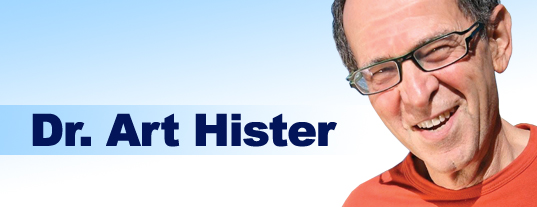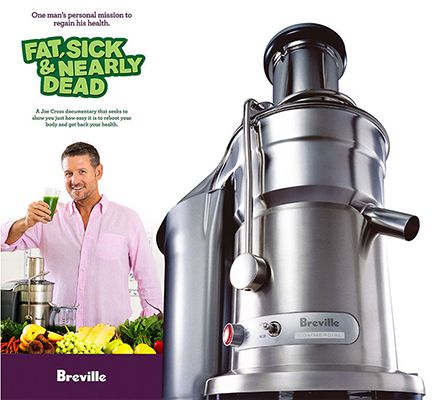Joe Cross inspiring people to improve their health and reboot their lives
Dr Art Hister – Who owns your health information?

A common concern that pops up regularly in my email is about health records, namely, about who actually owns your medical records.
For once, I’m happy so say that the answer is pretty simple: you “own” all the health data that’s been accumulated about you, no matter where that data has been stored or by whom.
In other words, you own the record of your own health history and you own the record of your own pharmaceutical usage, although the people who took the “notes” own the actually physical source in which those notes have been stored.
But if you wish to switch health providers for some reason, the bottom line is straight-forward: you can do so and the owner of your health records must transfer that information to your new provider, something that’s much easier to do than it used to be since the widespread introduction of electronic forms of storing data.
And as always, when in doubt or if you have any questions, speak to your health professional directly about your concerns.
Dr Art Hister – ASA Use and Blindness

Here’s yet another reason to be cautious about jumping on the ASA bandwagon. A study has linked the regular use of ASA with a higher risk of age-related macular degeneration or AMD, a very debilitating form of eye disease in which the central part of the retina, the macula, is gradually destroyed, which leads to progressive inability to see.
In this European study, people who took ASA regularly had roughly double the risk of “wet” AMD, the most serious form of the condition, compared to people who weren’t taking ASA.
Now, for many people, the benefits of taking ASA may – probably do – still outweigh the risks, but the key thing to remember is that there is no formula for this and the best thing to do (it should be mandatory, I think) is that anyone taking ASA regularly sit down and have a good discussion with their primary care doctor about the balance between the risks and benefits of ASA for their particular unique situation.
Dr Art Hister – Watching TV can be good for you

TV gets a very bad rap when it comes to assigning blame for our evident problems with obesity. Study after study has concluded that people who watch TV weigh way more than non-TV watchers. The former do less exercise, and they also tend to have much worse diets.
But two very key questions that remain unanswered by most of these studies are these: is it the TV watching that leads to the poorer health habits? Or do people with poor health habits choose to watch more TV?
And second, are all TV watchers equally at risk?
Well, seems to me that if there were no TV around, people who want to sit and eat fatty snacks would find other ways to fulfill their needs so I have long tended to absolve TV of much of the blame for why we’re fat and lazy (and yes, perhaps my views are coloured by the fact that I work on TV).
But there is a bit of evidence now to point to in order to back up what I believe: A European study published in the International Journal of Public Health has concluded that “news junkies” (mostly from TV, but also those who follow news on radio and in the press), tend to have healthier diets (specifically, they adhere more closely to a Mediterranean diet) than do people who are not avid news followers, which translates into eating more fruit and more fresh fish while consuming less meat.
In other words, TV viewing can actually improve health outcomes, which is why if you’re not doing it already, you should make a resolution to never – never, never – miss another episode of Health Headlines with Dr. Art Hister on Global TV.
Just suggesting this for your health, of course.
Dr Art Hister – Yet another reason to eat your veggies

The good news is that you can lower your risk of stroke.
The bad news, at least for some of you, is that you have to eat your veggies.
A study (published in the journal Stroke: Journal of the American Medical Association) involving over 30,000 Swedish women, some of whom had pre-existing cardiovascular disease, found that those who ate the best diet in terms of anti-oxidant intake had a significantly lower risk of stroke than women who ate a poorer diet, which is no surprise, of course.
But what is a bit of a surprise is that the women eating an anti-oxidant-rich diet had a lower risk of stroke even if they had a history of heart disease.
In other words, and this should be no surprise, the people who likely gain the most from starting to follow a healthy health practice, which in this case is to eat your veggies, are also likely to gain the most from making that change.
Which doesn’t mean, of course, that those of us who are already doing the right things don’t have to emphasize doing them as much – it’s just that we start from a better place in that dash to live longer and healthier, so we don’t have nearly as much to gain from improving what we are already doing.
Dr Art Hister – Exercise makes you better

I know you’re probably sick of hearing by now about how you need to exercise more in order to prevent so many conditions, especially, of course, cardiovascular problems like heart attacks, heart failure, and strokes.
In fact, exercise is such an effective “preventer” of illness, if it came in the form of a pill, everyone would be lining up to get more than their fair share to swallow.
But what’s so amazing about the benefits of exercise to me is that it’s not only the best weapon we have to fight off many conditions, it’s an effective tool to make a person feel better even after they’ve become sick with such conditions, and the latest evidence of that comes from a Spanish study presented at the recent American Stroke Association meeting.
In this study which involved 159 patients, the researchers concluded that the higher the level of fitness in a stroke victim, the better their chances of surviving the stroke with less damage.
That is, if you are unlucky enough to suffer a stroke, the wee bit of good news is that the more fit you were to begin with, the more effectively the anti-clotting drugs that prevent stroke damage if given shortly after a stroke will work on you.
Dr. Art Hister – Cell Phones and Stress

In this medical business, for every person who thinks some new finding is a “yin”, there’s another one who thinks it’s really a “yang”.
Take this recent report about cell phone use from a group of British psychologists which was presented at a meeting of the British Psychological Society.
In this study based on testing more than 100 study subjects, the researchers reported that although most people who use cell phones start off using them appropriately (for some reason, they concluded that most people start using cell phones for business purposes; try telling that to any 10- or 12-year-old texting her friends endlessly; but that’s a small quibble about the findings), most people soon end up being governed by their cell phones, that is, they compulsively check their phones for messages, and the end up exhibiting stress-related symptoms as a consequence of needing to be in touch all the time.
That, I suggest, is the yin interpretation of these findings.
The yang comes from an American psychologist who was asked to critique these findings and who said that she didn’t really see that compulsively checking a cell phone was a bad thing.
First, not only is it likely, she said, that it’s basically people who are pre-destined to be more stressed who are also those who end up allowing their cell phones to govern their lives (that’s certainly true) but also, she said, the great thing about checking a cell phone regularly means that we’re more “in touch” with the world. Although if you ask me, anyone who needs to check their cell phone or email every 5 minutes – and there are so many people who do exactly that or equally annoying, those that set their cell phones to beep as a new message comes through– are not really in “touch” so much as they are being tackled. She says that we can also multi-task more which is just plain wrong, as anyone who has ever been behind a driver talking on a cell phone and trying to drive at the same time know that this can’t be done well, folks.


